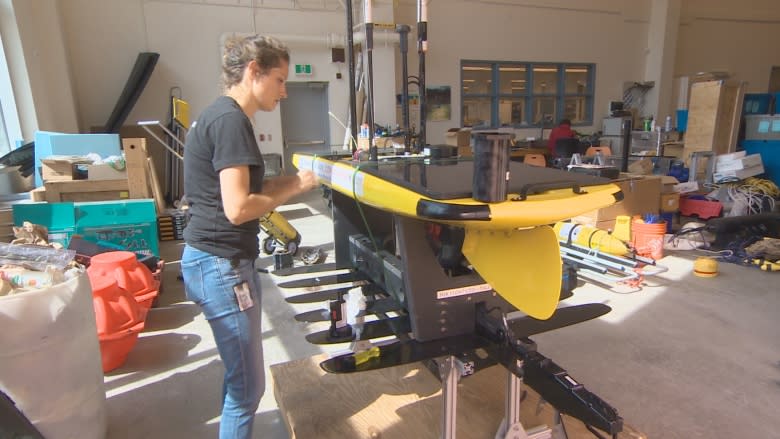Autonomous glider to track critically endangered right whales
Scientists in Halifax have launched a high-tech tool to track the whale population on the Scotian Shelf.
A solar-power Wave Glider, equipped with an underwater microphone, was deployed Wednesday off the coast and will spend 30 days listening for the characteristic sounds of endangered North Atlantic right whales.
"What this Wave Glider allows us to do is to go out and do some reconnaissance, do some exploratory work to ask the question: Are right whales still present in these areas off of Halifax?" Kimberley Davies, a Dalhousie University oceanographer, said in an interview Tuesday.
2017 a bad year for right whales
Davies said the yellow and black glider, about the size of a kitchen table, uses wave action to move along the water and send back audio data of the right whales, as well as humpbacks and blue whales.
This year has been bad for the right whale.
A dozen have been found dead on the East Coast, accounting for about two per cent of the entire population, estimated to be about 500.
Ten have been found dead in the Gulf of St. Lawrence since June 7 and two others, including one just last week, were discovered off the coast of Cape Cod, Mass.
Four of the animals showed evidence of ship strikes while another appeared to have become entangled in fishing gear and at least one is still pending a necropsy. Some were too badly decomposed to determine cause of death.
Biologist Regina Asmutis-Silvia of the Plymouth, Mass.-based group Whale and Dolphin Conservation said this summer has been the worst season for right whale deaths since hunting them became illegal 80 years ago.
"This level of deaths in such a short time is unprecedented," she told The Associated Press. "I just don't know that right whales have time for people to figure it out. They need help now."
Reducing entanglements
Davies said right whales are a part of Nova Scotia's heritage and their dwindling numbers should be a big concern.
"Humans are part of the causes of the mortality of these species and there is something we can do about that, that's why Nova Scotians should care," she said.
"We can, if we know where the whales are, reduce ship strikes, we can reduce fishing gear entanglements in these animals. We just really have to have the information [of] where they are."
Fisheries and Oceans Canada is using a host of new methods to try to help the whales, including surveillance flights along the Gulf of St. Lawrence coastline and closing a snow crab fishing area, said Sarah Gilbert, a spokeswoman for the department. The Canadian government also recently announced new speed restrictions for ships.
It's believed 80 to 100 right whales are in the Gulf of St. Lawrence.




